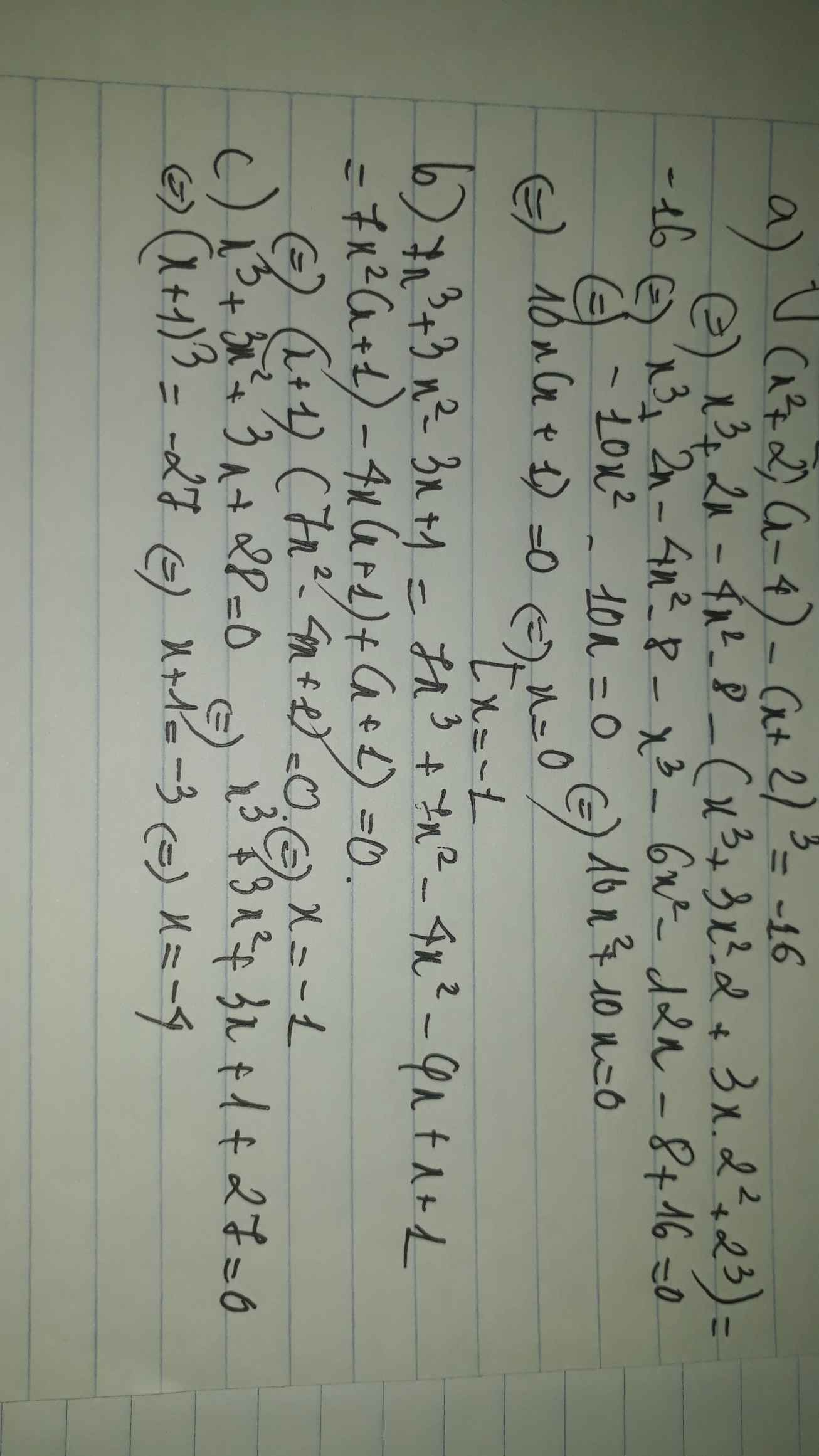x^3+3x^2+3x+28=0

Những câu hỏi liên quan
Tìm x, biết x^3 + 3x^2 +3x +28 =0
x3+3x2+3x+28=0
<=>x3+3x2+3x+1=-27
<=>(x+1)3=(-3)3
<=>x+1=-3
<=>x=-3-1
<=>x=-4
Vậy x=-4
Đúng 0
Bình luận (0)
Nếu theo Ác Mộng thì 3x2 và 3x đi đâu rồi ???
Đúng 0
Bình luận (0)
Bạn Ác Mộng đúng mà. Bạn Ngọc không nhìn ra à?
Đúng 0
Bình luận (0)
Gpt:
a,\(3x^3-x^2+2x-28+\left(x^3-4\right)\sqrt{x^3-7}=0\)
b,\(8x^9+x^3=3x^2+4x+2\)
ĐKXĐ: \(x\ge\sqrt[3]{7}\)
\(4x^3-x^2+2x-32+\left(x^3-4\right)\left(\sqrt{x^3-7}-1\right)=0\)
\(\Leftrightarrow\left(x-2\right)\left(4x^2+7x+16\right)+\dfrac{\left(x^3-4\right)\left(x-2\right)\left(x^2+2x+4\right)}{\sqrt{x^3-7}+1}=0\)
\(\Leftrightarrow\left(x-2\right)\left(4x^2+7x+16+\dfrac{\left(x^3-4\right)\left(x^2+2x+4\right)}{\sqrt{x^3-7}+1}\right)=0\)
\(\Leftrightarrow x=2\) (ngoặc đằng sau luôn dương do \(x^3-4=x^3-7+3>0\))
2.
\(\Leftrightarrow\left(2x^3\right)^3+2x^3=x^3+3x^2+3x+1+x+1\)
\(\Leftrightarrow\left(2x^3\right)^3+2x^3=\left(x+1\right)^3+x+1\)
Đặt \(\left\{{}\begin{matrix}2x^3=a\\x+1=b\end{matrix}\right.\)
\(\Rightarrow a^3-b^3+a-b=0\Leftrightarrow\left(a-b\right)\left(a^2+ab+b^2+1\right)=0\)
\(\Leftrightarrow a=b\)
\(\Rightarrow2x^3=x+1\Leftrightarrow\left(x-1\right)\left(2x^2+2x+1\right)=0\)
Đúng 1
Bình luận (0)
Tim x:
a)(x-2)(x+2)=x.(x-3)
b)x^3+3x^2+3x+28=0
c)x^3-6x^2+12x-9=0
tìm x thỏa mãn:
a) (x2+2)(x-4)-(x+2)3=-16
b) 7x3+3x2-3x+1=0
c) x3+3x2+3x+28=0
a: Ta có: \(\left(x^2+2\right)\left(x-4\right)-\left(x+2\right)^3=-16\)
\(\Leftrightarrow x^3-4x^2+2x-8-x^3-6x^2-12x-8=-16\)
\(\Leftrightarrow-10x^2-10x=0\)
\(\Leftrightarrow-10x\left(x+1\right)=0\)
\(\Leftrightarrow\left[{}\begin{matrix}x=0\\x=-1\end{matrix}\right.\)
c: Ta có: \(x^3+3x^2+3x+28=0\)
\(\Leftrightarrow\left(x+1\right)^3=-27\)
\(\Leftrightarrow x+1=-3\)
hay x=-4
Đúng 0
Bình luận (0)
Tìm x biết a) x(x-25)=0 b)2x(x-4)-x(2x-1)=-28 c)x^2 -5x=0 d)(x-2)^2-(x+1)(x+3)=-7 e)(3x+5).(4-3x)=0 f)x^2-1/4=0
a: \(x\in\left\{0;25\right\}\)
c: \(x\in\left\{0;5\right\}\)
Đúng 1
Bình luận (0)
Bài 3.giải các phương trình sau bằng cách đưa về phương trình tích.
a) (3x+1)(7x+3)=(5x-7)(3x+1)
b) x^2+10x+25-4x(x+5)=0
c) (4x-5)^2(16x^2-25)=0
d) (4x+3)^2=4(x^2-2x+1)
e) x^2-11x=28=0
f) 3x^3-3x^2-6x=0
Tìm x, biết:
a) 7x2 - 28 = 0
b) \(\dfrac{2}{3}\)x(x2 - 4) = 0
c) 2x(3x - 5) - (5 - 3x) = 0
d) (2x - 1)2 - 25 = 0
a) Ta có: \(7x^2-28=0\)
\(\Leftrightarrow7\left(x^2-4\right)=0\)
\(\Leftrightarrow7\left(x-2\right)\left(x+2\right)=0\)
mà 7>0
nên (x-2)(x+2)=0
hay \(\left[{}\begin{matrix}x-2=0\\x+2=0\end{matrix}\right.\Leftrightarrow\left[{}\begin{matrix}x=2\\x=-2\end{matrix}\right.\)
Vậy: \(x\in\left\{2;-2\right\}\)
b) Ta có: \(\dfrac{2}{3}x\left(x^2-4\right)=0\)
\(\Leftrightarrow\dfrac{2}{3}x\left(x-2\right)\left(x+2\right)=0\)
mà \(\dfrac{2}{3}>0\)
nên x(x-2)(x+2)=0
hay \(\left[{}\begin{matrix}x=0\\x-2=0\\x+2=0\end{matrix}\right.\Leftrightarrow\left[{}\begin{matrix}x=0\\x=2\\x=-2\end{matrix}\right.\)
Vậy: \(x\in\left\{0;-2;2\right\}\)
c) Ta có: \(2x\left(3x-5\right)-\left(5-3x\right)=0\)
\(\Leftrightarrow2x\left(3x-5\right)+\left(3x-5\right)=0\)
\(\Leftrightarrow\left(3x-5\right)\left(2x+1\right)=0\)
\(\Leftrightarrow\left[{}\begin{matrix}3x-5=0\\2x+1=0\end{matrix}\right.\Leftrightarrow\left[{}\begin{matrix}3x=5\\2x=-1\end{matrix}\right.\Leftrightarrow\left[{}\begin{matrix}x=\dfrac{5}{3}\\x=-\dfrac{1}{2}\end{matrix}\right.\)
Vậy: \(x\in\left\{\dfrac{5}{3};-\dfrac{1}{2}\right\}\)
d) Ta có: \(\left(2x-1\right)^2-25=0\)
\(\Leftrightarrow\left(2x-1-5\right)\left(2x-1+5\right)=0\)
\(\Leftrightarrow\left(2x-6\right)\left(2x+4\right)=0\)
\(\Leftrightarrow\left[{}\begin{matrix}2x-6=0\\2x+4=0\end{matrix}\right.\Leftrightarrow\left[{}\begin{matrix}2x=6\\2x=-4\end{matrix}\right.\Leftrightarrow\left[{}\begin{matrix}x=3\\x=-2\end{matrix}\right.\)
Vậy: \(x\in\left\{3;-2\right\}\)
Đúng 0
Bình luận (0)
a,7x2 - 28 = 0
=> 7x2 = 28 => x2 = 4 => x = 2
b,2/3x(x2 - 4) = 0
=>2/3x(x - 2)(x + 2) = 0
=> x ∈ {0 ; 2 ; -2}
c,2x(3x - 5) - (5 - 3x) = 0
= 2x(3x - 5) + (3x - 5)
= (3x - 5)(2x + 1) = 0
=> x ∈ { 5/3 ; -1/2}
d, (2x - 1)2 - 25 = 0
=> (2x - 4)(2x - 6) = 0
=> x ∈ {2 ;3}
Đúng 0
Bình luận (0)
a,7x2 - 28 = 0
=> 7x2 = 28 => x2 = 4 => x = 2
b,2/3x(x2 - 4) = 0
=>2/3x(x - 2)(x + 2) = 0
=> x ∈ {0 ; 2 ; -2}
c,2x(3x - 5) - (5 - 3x) = 0
= 2x(3x - 5) + (3x - 5)
= (3x - 5)(2x + 1) = 0
=> x ∈ { 5/3 ; -1/2}
d, (2x - 1)2 - 25 = 0
=> (2x - 4)(2x - 6) = 0
=> x ∈ {2 ;3}
Đúng 0
Bình luận (0)
Giải phương trình :
1) √x2+x+2 + 1/x= 13-7x/2
2) x2 + 3x = √1-x + 1/4
3) ( x+3)√48-x2-8x= 28-x/ x+3
4) √-x2-2x +48= 28-x/x+3
5) 3x2 + 2(x-1)√2x2-3x +1= 5x + 2
6) 4x2 +(8x - 4)√x -1 = 3x+2√2x2 +5x-3
7) x3/ √16-x2 + x2 -16 = 0
Giải các phương trình sau bằng cách đưa về phương trình tích:
a) (3x+1)(7x+3)=(5x-7)(3x+1)
b) x^2+10x+25-4x(x+5)=0
c) (4x-5)^2-2(16x^2-25)=0
d) (4x+3)^2=4(x^2-2x+1)
e) x^2-11x+28=0
f) 3x^3-3x^2-6x=0
a) ( 3.x + 1 ) . ( 7.x + 3 ) = (5.x-7 ) . ( 3.x + 1 )
<=> ( 3.x + 1 ) . ( 7.x + 3 ) - ( 5.x - 7) . ( 3.x + 1 ) = 0
<=> ( 3.x + 1 ) . ( 7.x + 3 - 5.x + 7 ) = 0
<=> ( 3.x + 1 ) . ( 2.x + 10 ) = 0
<=> \(\orbr{\begin{cases}3.x+1=0\\2.x+10=0\end{cases}\Leftrightarrow\orbr{\begin{cases}x=\frac{-1}{3}\\x=-5\end{cases}}}\)
Vậy x = { \(\frac{-1}{3};-5\)}
b) x2 + 10.x + 25 - 4.x . ( x + 5 ) = 0
<=> ( x + 5 )2 -4.x . (x + 5 ) = 0
<=> ( x+ 5 ) . ( x + 5 - 4.x ) = 0
<=> ( x + 5 ) . ( 5 - 3.x ) = 0
<=> \(\orbr{\begin{cases}x+5=0\\5-3.x\end{cases}\Leftrightarrow\orbr{\begin{cases}x=-5\\x=\frac{5}{3}\end{cases}}}\)
Vậy x = \(\left\{\frac{5}{3};-5\right\}\)
c) (4.x - 5 )2 - 2. ( 16.x2 -25 ) = 0
<=> ( 4.x-5)2 -2 .( 4.x-5) .( 4.x + 5 ) = 0
<=> ( 4.x -5 )2 - ( 8.x+ 10 ) . ( 4.x -5 ) = 0
<=> ( 4.x -5 ) . ( 4.x-5 - 8.x - 10 ) = 0
<=> ( 4.x - 5 ) . ( -4.x - 15 ) = 0
<=> \(\orbr{\begin{cases}4.x-5=0\\-4.x-15=0\end{cases}\Leftrightarrow\orbr{\begin{cases}x=\frac{5}{4}\\x=\frac{-15}{4}\end{cases}}}\)
Vậy x = \(\left\{\frac{5}{4};\frac{-15}{4}\right\}\)
d) ( 4.x + 3 )2 = 4. ( x2 - 2.x + 1 )
<=> 16.x2 + 24.x + 9 - 4.x2 + 8.x - 4 = 0
<=> 12.x2 + 32.x + 5 =0
<=> 12. ( x +\(\frac{1}{8}\) ) . ( x + \(\frac{5}{2}\)) = 0
<=> \(\orbr{\begin{cases}x+\frac{1}{6}=0\\x+\frac{5}{2}=0\end{cases}\Leftrightarrow\orbr{\begin{cases}x=\frac{-1}{6}\\x=\frac{-5}{2}\end{cases}}}\)
Vậy x = \(\left\{\frac{-1}{6};\frac{-5}{2}\right\}\)
e) x2 -11.x + 28 = 0
<=> x2 -4.x - 7.x + 28 = 0
<=> ( x - 7 ) . ( x - 4 ) = 0
<=> \(\orbr{\begin{cases}x-7=0\\x-4=0\end{cases}\Leftrightarrow\orbr{\begin{cases}x=7\\x=4\end{cases}}}\)
Vậy x = { 4 ; 7 }
f ) 3.x.3 - 3.x2 - 6.x = 0
<=> 3.x. ( x2 -x - 2 ) = 0
<=> 3.x. ( x - 2 ) . ( x + 1 ) = 0
<=> \(\orbr{\begin{cases}x-2=0\\x+1=0\end{cases}\Leftrightarrow\orbr{\begin{cases}x=2\\x=-1\end{cases}}}\)
\([x=0\) \([x=0\)
( Lưu ý :Lưu ý này không cần ghi vào vở : Chị nối 2 ý đó làm 1 nha cj ! )
Vậy x = { 2 ; -1 ; 0 }























